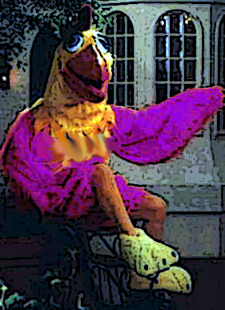
The Roosters(continued)
By Jim Hanley
The first three innings were uneventful — one weak hit by each team, and that was it. In the bottom of the fourth, Hoo singled through the infield. The Roosters' power hitter, Lefty Carlo Conte, came up to bat. He, too, was unique. First of all, he was right-handed; secondly, he was superstitious. Joey once told him that the ball field was built on an old cemetery and there were still bodies buried in the outfield. Carlo swung at each pitch to send the ball over fence; he believed that a hard ground ball bouncing off the outfield grass would upset the spirits. The next pitch, a curve, circled the plate and Carlo caught the ball with the end of the bat, driving it into the ground beneath the outfielder's grasp. The ball bounced high and came down a few more times before rolling to the fence. Carlo crossed himself on the way to first. Later he was picked off while mumbling his third Hail Mary on the rosary in his uniform pants pocket. Joey came to bat and connected with the first pitch to drive Hoo home. The Roosters scored two more runs before the third out.
The fifth inning was tough for the Roosters' pitcher. Weaver's fastball was floating up, and the first two batters singled. The catcher walked to the mound to calm the pitcher. "Don't worry, no runs." Weaver looked down at his hosiery then lifted his head and smiled at the catcher: "Thanks for noticing." Fortunately for the Roosters, the next three batters flied out.
On the way to the dugout, Guillermo called out to the shortstop, "Hey, Joey, cha-cha-cha?"
The Rooster mascot ran onto the field for the fifth inning egg toss (another blunder by Uncle Louie, who didn't realize roosters don't lay eggs). As Lenny tossed the hard-boiled eggs in the stands, an intern from the local newspaper jumped over the fence to talk to the dancing rooster. Sticking a recording microphone under Lenny's beak, he asked, "Do you fill out the entire costume?" Lenny blushed unnoticed under the heavy suit, and before he could do anything, a security guard grabbed the frightened intern, who was not consoled by the Rooster manager calling out to the burly guard, "Don't kill him!"
The score stayed three-nothing until the ninth inning. Weaver had regained his control, and the opposing team hit only three balls out of the infield. In the top of the ninth, with two out, Dave Hoo stood off first base to hold a runner who'd walked. Guillermo called to him to move toward second for the next batter, who pulled his hits to the right. Dave never heard the warning; all he could hear was Natalie from the Hoo-ers, yelling, "You dropped a quarter, Dave." A line drive went past his glove and the speedy runner on base went home from first as Joey, looking into his Spanish-English dictionary for the word for heterosexual, missed the throw from the outfield and the score was three to one. The opposing team's best hitter lunged at Weaver's next pitch, and the ball sailed over the head of Amid, the Iranian center fielder. The score was now three-two.
The manager signaled for the Rooster's ace reliever, Junkball Johnny. As Johnny limped to the mound, the billboard flashed his major league experience on the screen: one pitch in a playoff game. Known for his fastball and wildness, Johnny was called up in the fall, 1984, and after missing the strike zone during his warm-up, his first pitch sailed over the batter's head (and anyone else's less than eight feet tall) and flew into the reserved box seats, hitting the team owner in the mouth and breaking three teeth. Johnny never pitched above AA after that, lost his fastball, and relied on his corkscrew, a looping toss that shifted directions like a confused snake. The batter fouled Johnny's first pitch but struck the next with the center of the bat, sending the hard grounder to Joey's right. After an initial bobble, Joey, seeing an opposing player round second, froze. The catcher, watching the base runners, forgot to signal. If he followed his instinct to throw to first, Joey wouldn't get the fastest runner in the league. Out of the comer of his eye, he saw a flame on the head of an old lady, Natalie of the Hoo-ers. To quickly get Joey's attention, she'd pulled out a cigarette lighter from her purse and set fire to her dry purple hair, which ignited like seasoned hay. Joey looked at her as another Hoo-er threw beer on Natalie's head; the geriatric fan flashed four fingers, and the shortstop turned toward home plate and fired the ball to the catcher, who stood in the way of the runner charging from third base. The last sound heard before the cheers erupted was out! The Roosters won the last game of the season.
After the game Dave left with the Hoo-ers for a final game drink; Natalie
with her charred, purple hair, whispered to the first baseman, "Ever
try a foursome?" Joey walked toward the parking lot with Guillermo,
flipping through his Spanish-English dictionary, trying out words in
preparation for a fruitless pursuit to play winter ball in Latin America.
Brian Weaver, the starting pitcher, walked hurriedly for the closing
sale at the Big Woman Dress Shop. They were all leaving, uncertain who
would return, who would move up to Double A, who would tire of the routine
and work in family construction. They accepted the nomadic, unpredictable
life with dim grace, buoyed by memories of occasionally spectacular
plays, game-winning hits and the cheers from short-memory fans. Baseball
was addictive and for the moment, the Roosters had no wish to be cured.